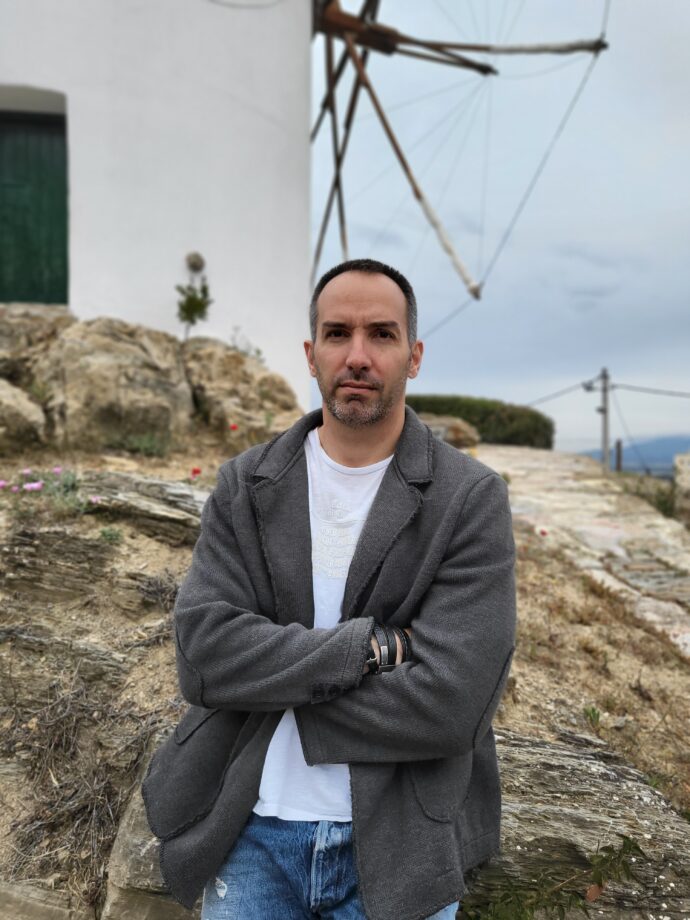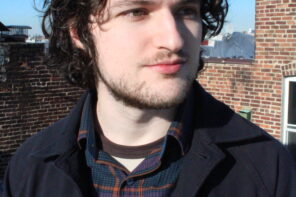The mass stops the minute Fishbone crosses the threshold of the church. The cantor stops unfolding his long masculine notes, and the priest’s chapped lips, whose kiss stings like thistle, are sealed shut. Shut, like the door behind Fishbone, but without the bang that makes the villagers jerk. The screech of a chandelier’s rope, the rustle of a coat, the cough of the cantor, everything floats in the hush; sharp and stillborn sounds, like foam on the back of the sea.
Fishbone rubs their hands, holding the unlit candle between them. The frankincense reminds them of the cassock hanging from the cracked pew, the one with the woodcut cross–a deacon’s gift to their mother, when she was still alive. Nausea. Hundreds of lit candles, on candelabras, prickets and chandeliers radiate a hollow heat. Perhaps, if people lit their candles then Fishbone’s fingers would warm up. Not their permanently freezing soles though, planted on the cold marble, as if stepping onto the thick red carpet, just an inch away, would be a sin.
Fishbone didn’t expect to find people in the church; they didn’t know how long the service lasts–in their homeland, the temples stood by the sea, there were tridents instead of crosses, and their rites were short. But it had been a while since nightfall and Fishbone had heard bells chime, and it sounded as if they came from the sea–the way it happened back home. Fishbone had come out of their nest and gazed at the horizon for hours on end, but had seen nothing. No sunken chapel, no cape, no fishpeople. Then they remembered the candle the gendarme had given them as a gift, and so they left the nest, hoping to run across somebody on the way to lent them some of the holy light. The gendarme perhaps, or maybe a child, one of those who now look at them with empty eyes, clutching unlit candles–it’s been a while since Fishbone saw them and they saw Fishbone, since they cut locks of Fishbone’s hair with switchblades, since they buried Fishbone in the sand or pushed Fishbone to roll down a pissed slope.
So Fishbone didn’t expect to find people in the church, but still, coming here was a mistake; so much is obvious looking at the left side of the church, at the women’s clenched jaws, their faces easily recognized under the light; they used to visit Fishbone in the mornings. Fishbone sees their mistake on the seamstress’ face, who has stopped giving them patched clothes to cover the soft scales on their legs. On the baker’s face, who stopped giving them dried bread. On the milkwoman’s face, who never brought them last day’s milk ever again. And they see their mistake at the right side of the church, on the men’s lowered heads, barely recognizable since the men only come to their nest on moonless nights. On the captain’s face, who has a harpoon scar on the fat roll above his loins, and gave them the tattered coat–the one they’re wearing now–to hide the silky ribbon-like fin on their back. On the grocer’s face, who gives them pomegranates, and his bones are pointy and sharp, just like Fishbone’s. On the milkman’s face, who brought them milk the other day, and whose bristly beard left pink blotches on Fishbone’s nape, which stung when they went into the sea in the morning. And on the gendarme’s face, who gave them this very candle but forgot to tell them not to dare step foot in here. Now he looks at Fishbone, and his cheeks, his jaw and his forehead bloat and countless red pimples blossom upon them, like clusters of berries.
A whisper, a word: the Satan or the horned one or the devil’s child or perhaps the Fishbone; Fishbone didn’t catch it. But just after that, as if the word is a signal, the gendarme approaches. Fishbone takes some steps back, hitting the flaking door leaf; a pebble wedges into their heel. The gendarme’s boots now echo on the marble. Fishbone throws themself on the double door–its leaves are heavy, rough, full of splinters. They push them–they creak, they screech against the marble floor, they give slowly. They open slightly, just a slit, and Fishbone squeezes through. A sudden gust slaps them and they drop the candle; the wind has bristled. Fishbone picks the candle up and starts running.
The world melts into things nearby and things faraway. Things faraway and still, straight ahead: the street, the darkness, the velvet clouds huddled together in the sky, hiding the stars and the moon. And things nearby, evermoving: houses, yards, fences, apple trees, pomegranates, fig trees, and then cedars, olive trees, pine trees, barren fields, oak trees and finally rocks, dunes and bulrushes; all are divided like the people in the church, left and right, running backwards from Fishbone, as the roar of the wind is booming louder and louder. Things faraway and nearby; faraway and still and blurry: the sunny days and the starry nights at their homeland. And nearby: their father’s fingers closing without catching the oar, the waves carrying him away, their mother’s words, words of prayer–don’t be afraid, we came from the sea and unto the sea we go–, frozen bodies, cramped in the boat, the sand of the unfamiliar coast hollowing out under knees, people on fours like starving dogs, the locals’ curses–the sunken chapel spat up the devils–and the first blows with oars–look at those patches of scales on their skin, they’re the fishpeople–, the horror in their voices–they don’t bury their dead, they throw them to the sea–, the mockery of the children–even their men look like women–, their new name–Fishbone. And then followed the nights in the cave, before Fishbone named it a nest, with their people becoming fewer and fewer. Until Fishbone and their mother were left alone, and the locals stopped coming in groups to vent on the others’ backs, but came one by one to vent on their mother, until she finally died, with the same prayer on her lips–we came from the sea, and unto the sea we go–, and Fishbone learnt firsthand what they were doing to her at the back of the cave.
Time and the world solidify. Fishbone stands before the dark rocks that tower high above the opening of the cave like a giantess’s granite chest. They’re flushed from running and the wind whips them with freezing raindrops. They go towards the slit in the stone, but their toes barely touch the rough landing. Their heel remains suspended; lightning freezes their step, as the echo of the heavenly thunder reminds them of chimes. A blinding slash slits the horizon, revealing the smudge of clouds, a narrow ribbon of sky, the outline of the mountains, the sheet of the sea, its watery tatters on the beach and a strange brushstroke stretching across from the coast.
Could it be the one they were looking for on so many nights, in vain? Darkness swallows the flash, the clouds, the horizon, the water, the beach and Fishbone’s vision. No. They didn’t hear chimes in the thunder, and even if they did, they didn’t see any cape, and even if they saw something, certainly there was no chapel at its end; and even if they saw the sunken chapel, certainly their parents and their compatriots were no fishpeople, just people who, when they die, are claimed by the sea. But during this pause of darkness and cold and windy roar, Fishbone’s heart booms. And perhaps because they’ve forgotten all about the run, they attribute its rhythm to yearning: why can’t this vision be real? Their gaze shoots out to penetrate the night, as if it can hook onto the chapel and fish it out, as they were desperate to do last summer when they dived every day, since their mother wasn’t alive to stop them, and the villagers’ fears encouraged them instead of scaring them off–I’m not like them, I’m not scared of what they’re scared of, I’m not like them. And their visits made death seem a trifling risk before Fishbone’s hope to bring the myth to life, along with the cape and the sunken chapel–could the sunken chapel perhaps be one of their own ancient temples? Could these fishpeople the locals talked about be the souls of their own people?
Fishbone stretches their webbed fingers; they’re sticky. They’ve dug prints on the candle. How come they still carry it? They bow their head, catch it from the fuse and drag it behind them. They don’t throw it away, they need its light and melted candle smoothens out the rough stone corners where they sleep.
Just before entering the slit, something flashes on the horizon, around the spot they were gazing at, as if their gaze had pierced the veil of darkness. It’s just a glowing spot, but its light outlines a stone path that lies gently on the water.
Fishbone closes their fingers around the candle prints, clutches the candle and walks towards the cape. Now, the only faraway and still thing is this phosphorescent spot; the evermoving waves splash right and left of the stone path. Fishbone’s feet step on stone that’s carved and–how strange–damp and warm. With every step their soles sink into something insubstantial and warm and–how strange–not liquid, which slowly curls up around their ankles, as if there’s a thick mist floating above the stone. The wind howls monotonously, but calms down where their calves are swathed in warmth, and then their knees, as if this quiet membrane of peace that swallows them is climbing up or whether Fishbone is walking on a piece of land that’s being flooded by the tide. Soon, their loins, their waist, their entire body sinks in this ethereal paste, which–how strange–shares the surface of the sea. Now it’s wreathed around their neck, untying the knot that was stealing their breath. It caresses their chin. It caresses their lips, and Fishbone tastes milk and smells their mother’s sweat–their nose is submerged. They hear an underwater roar and see a blue blur–their eyes and ears are submerged. Now the world is still and thick and as Fishbone submerges whole, their clothes slide off their body and the roots of their fin tickle as it sways.
The glowing spot splits into two pearls: two bright windows of a tiny temple, like the temples they knew back home. It’s got a double door, just like the village church. It’s got a dome, but no bell tower, and on the top there is a trident instead of a cross. High up, in the vast blue blur, something flashes iridescent; a school of fish whose smooth scales reflect the temple’s light. Fishbone reaches the double door and presses their palms on it along with the candle. The door is wooden and rough and light, as if hollow, and, as it gives, the temple’s light hurts their eyes; Fishbone steps in, blinded. The warmth that enshrouds them is more intense than ever, and they open their eyes. Everything is outlined brightly, as if reflected on a silver tray; the hundreds of lit candles, the trident shaped candelabras, a small shell-shaped chandelier–the source of the floodlight–and a short passageway which leads to the back, to a standing figure. More figures stand on the left and on the right. They wear no clothes and their bodies are wrapped in enameled scales. Their facial features are neutral, the ones on the left no different from the ones on the right, for Fishbone there’s nothing to discern them from each other, nameless. They all hold lit candles in their hands, their flames like glimmering diamonds. Then a bell sounds. Fishbone looks at their hands, and at the top of their candle a flame sparkles.
Antony Paschos is a Greek author with short stories in Interzone, Galaxy’s Edge, ZNB Presents, Giganotosaurus, James Gunn’s Ad Astra, and other magazines. He has published three books in Greek. His work has been translated into four more languages. He is a member of the Athens Club of Science Fiction, and lives in Athens.
Facebook: https://www.facebook.com/apashos
Instagram: https://www.instagram.com/antony_paschos/
Twitter/X: https://twitter.com/Antony_Paschos




